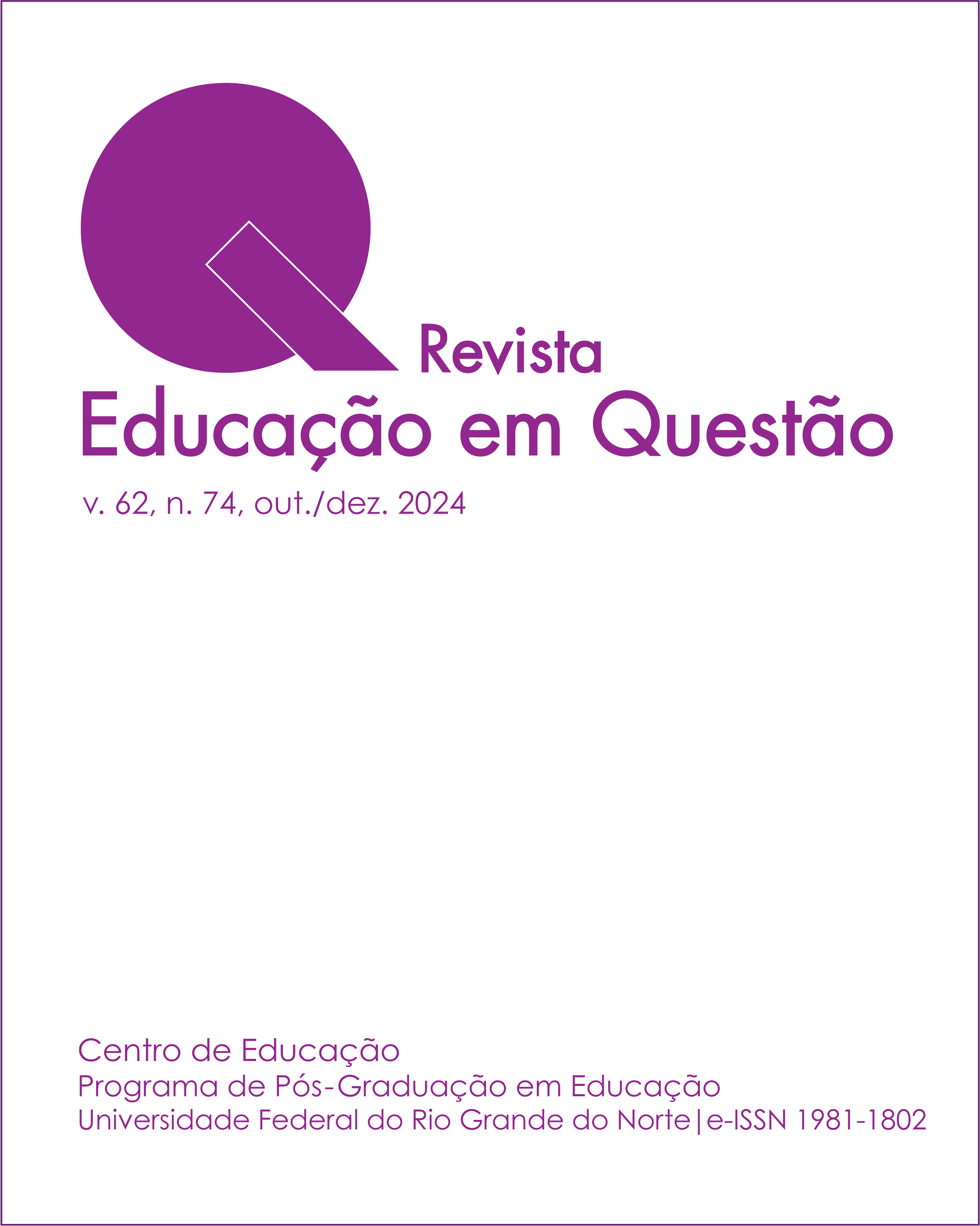Thought experiment
rhetoric and education
DOI:
https://doi.org/10.21680/1981-1802.2024v62n74ID36719Keywords:
Thought experiment, Humanist pedagogy, John Dewey, Teacher formationAbstract
The thought experiment is an argumentative resource commonly used in the field of philosophy, but little present in educational research. This article aims to characterize this type of experiment as a rhetorical strategy capable of offering contributions to educational practices, particularly with regard to teacher formation aligned with humanizing pedagogical approaches. The article addresses the thought experiment in three dimensions: the experimental dimension, with the aim of arguing that there is no significant difference between thought experiments and usual experiments; the narrative dimension, highlighting its proximity to fiction literature; and the philosophical-educational dimension, with the purpose of showing its relevance in pedagogies that aim at the humanization of educational relationships, as proposed by John Dewey. The association of the thought experiment with Deweyan pedagogy favors the democratic way of life and values the liberation of imagination, subjectivity, and emotions, going against the mechanistic trend prevailing in education.
Downloads
References
ASSIS, Machado. Dom Casmurro. São Paulo: Globo, 1997.
CRICK, Nathan. Composition as experience: John Dewey on creative expression and the origins of “mind”. The Journal of the Conference on College Composition and Communication, v. 55, n. 2, p. 254-275, dez. 2003.
CRICK, Nathan. Democracy and rhetoric: John Dewey on the arts of becoming. Columbia: University of South Carolina, 2010.
CUNHA, Ivan Ferreira. Experimentos de pensamento na crise das ciências humanas e sociais: articulando duas ideias de Kuhn e o utopianismo de Neurath. Em Construção, Rio de Janeiro, n. 11, p. 73-85, 2022.
CUNHA, Marcus Vinicius. Ciência e educação na década de 1950: uma reflexão com a metáfora percurso. Revista Brasileira de Educação, Rio de Janeiro, n. 25, p. 116-126, jan./abr. 2004.
CUNHA, Marcus Vinicius. Arte, experiência e educação: o que a mensuração não pode mensurar. In: MORALES, Juan Mario Ramos; CASTANEDA, José Antonio Serrano; REYES, Blanca Flor Trujillo. (Orgs.). Deliberar con John Dewey: ciencias sociales e educación. México: Universidad Pedagógica Nacional, 2015.
CUNHA, Marcus Vinicius; COSTA, Sarah Passos V.; MERCAU, Horácio H. O valor educativo da história da filosofia no discurso de John Dewey. Cadernos de História da Educação, Uberlândia, v. 19, n. 3, p. 874-889, 2020.
DAVIDSON, Donald. Knowing one’s own mind. In: DAVIDSON, Donald. Subjective, objective, intersubjective. Oxford: Clarendon, 2001.
DEWEY, John. Como pensamos: como se relaciona o pensamento reflexivo com o processo educativo: uma reexposição. Tradução Haydée de Camargo Campos. 3. ed. São Paulo: Nacional, 1959a.
DEWEY, John. Democracia e educação: introdução à filosofia da educação. Tradução Godofredo Rangel e Anísio Teixeira. 3. ed. São Paulo: Nacional, 1959b.
DEWEY, John. Experiência e educação. Tradução Anísio Teixeira. São Paulo: Nacional, 1971.
DEWEY, John. Human nature and conduct: an introduction to social psychology. New York: Prometheus Books, 2002.
DEWEY, John. Arte como experiência. Tradução Vera Ribeiro. São Paulo: Martins Fontes, 2010.
ELGIN, Catherine Z. Fiction as thought experiment. Perspectives on Science, Cambridge, v. 22, n. 2, p. 221-241, 2014.
GÓRGIAS. Testemunhos e fragmentos. Tradução Manuel Barbosa e Inês de Ornellas e Castro. Lisboa: Colibri, 1993.
GREENE, Maxine. Releasing the imagination: essays on education, the arts, and social change. San Francisco: Jossey-Bass, 1995.
KUHN, Thomas. A estrutura das revoluções científicas. Tradução Beatriz Vianna Boeira e Nelson Boeira. 4. ed. São Paulo: Perspectiva, 1996.
KUHN, Thomas. Uma função para os experimentos mentais. In: KUHN, Thomas. A tensão essencial. Tradução Marcelo Amaral Penna-Forte. São Paulo: Unesp, 2011.
LISPECTOR, Clarice. A paixão segundo G.H. Rio de Janeiro: Rocco, 2020.
MERCAU, Horácio Héctor. Democracia criativa e retórica das emoções em John Dewey. Educação & Sociedade, Campinas, v. 43, p. 1-16, 2022.
NERSESSIAN, Nancy. In the theoretician’s laboratory: thought experimenting as mental modeling. Proceedings of the biennial meeting of the Philosophy of Science Association, Cambridge, v. 2, p. 291-301, 1992.
PERELMAN, Chaïm; OLBRECHTS-TYTECA, Lucie. Tratado da argumentação: a nova retórica. Tradução Maria E. Galvão. São Paulo: Martins Fontes, 2002.
PORCHAT PEREIRA, Osvaldo. Ciência e dialética em Aristóteles. São Paulo: Editora Unesp, 2001.
PRESTES, Zoia; TUNES, Elizabeth. A trajetória de obras de Vigotski: um longo percurso até os originais. Estudos de Psicologia, Campinas, v. 29, n. 3, p. 327-340, jul. 2012.
RORTY, Richard. A filosofia e o espelho da natureza. Tradução Antônio Trânsito. 2. ed. Rio de Janeiro: Relume-Dumará, 1994.
SILVA, Tatiane; CUNHA, Marcus Vinicius. Teoria e prática na formação clássica: o debate sofista. Revista Família, Ciclos de Vida e Saúde no Contexto Social, Uberaba, v. 3, n. 2, p. 69-77, 2015.
SILVA, Tatiane; CUNHA, Marcus Vinicius. Dewey e a experiência estética: uma contribuição ao ensino de arte. Revista Apotheke, Florianópolis, v. 7, n. 2, p. 28-43, out. 2021a.
SILVA, Tatiane; CUNHA, Marcus Vinicius. Educação, comunicação e imaginação em John Dewey: contribuições teóricas e práticas. Revista Brasileira de Estudos Pedagógicos, Brasília, v. 102, n. 262, p. 626-641, set./dez. 2021b.
SWIRSKI, Peter. Of literature and knowledge: explorations in narrative thought experiments, evolution and game theory. London/New York: Routledge, 2007.
THOUGHT EXPERIMENTS. In: Stanford Encyclopedia of Philosophy. Stanford University, 2023. Disponível em: https://plato.stanford.edu/entries/thought-experiment/ Acesso em: 9 fev. 2024.
WAGNER, Betty Jane. Dorothy Heathcote: drama as a learning medium. Washington, D.C.: National Education Association, 1976.
Downloads
Published
How to Cite
Issue
Section
License
Copyright (c) 2024 Journal Education in Question

This work is licensed under a Creative Commons Attribution-NonCommercial-ShareAlike 4.0 International License.
The Journal Education in Question shall retain the copyright in all articles that it publishes.
The authors and co-authors of articles and book reviews, published in the Journal Education in Question, shall wait for at least 1 (one) year before they are allowed to submit new works for publication.






